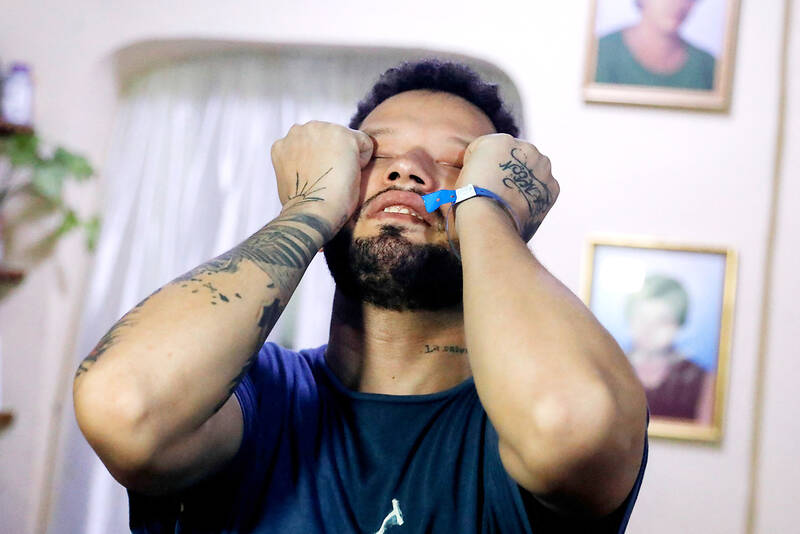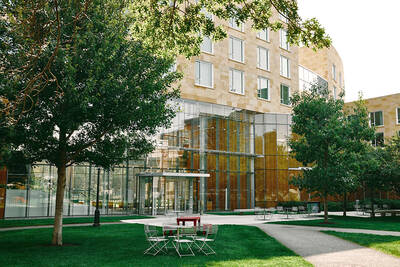Venezuela on Monday announced a probe into torture claims by 252 migrants the US had sent to a notorious Salvadoran prison, where they said they were beaten, sexually abused and fed rotten food.
Attorney General Tarek William Saab presented photographs and testimonies at a news conference in Caracas of some of the men, who said they had feared not making it out alive.
Several had bruises on their bodies, marks of being shot with rubber bullets, and one had a split lip.

Photo: Reuters
Andry Hernandez Romero, a 32-year-old beautician among those sent to the notorious CECOT prison as part of US President Donald Trump’s migrant crackdown, said he barely survived the ordeal.
“We were going through torture, physical aggressions, psychological aggressions,” he said in a video presented by Saab. “I was sexually abused.”
Saab said the prosecutor’s office was interviewing the returned migrants.
Many spoke of being held in “inhuman cells,” deprived of sunlight and ventilation, and given rotten food and unsafe drinking water.
The men had no access to lawyers or their relatives, and the last time many of them were seen was when Salvadoran President Nayib Bukele’s government issued photographs of them arriving at the prison shackled and with their heads shorn.
By Monday afternoon, the migrants had not yet been reunited with their families.
Officials said they were undergoing medical exams, being issued with new Venezuelan ID cards and interviewed by the prosecutor’s office.
Mercedes Yamarte, 46, said that she was preparing a welcome party for her 29-year-old son, Mervin, one of the men released from the prison Bukele built as part of his mass anti-gang crackdown.
She had put up balloons, banners and prepared food at their home in a poor neighborhood of Maracaibo in northern Venezuela, but had no idea when to expect him.
At lunchtime on Monday, she received a telephone call and heard the words: “Mom, it’s Mervin.”
“I hadn’t heard my son’s voice in four months and seven days, listening to him was a joy, a joy I cannot describe,” she said.
The men were accused in the US of being gang members and flown in March to El Salvador, after Trump invoked rarely used wartime laws to deport the men without court hearings.
Their treatment elicited an international outcry.
Saab said the Venezuelan investigation would target Bukele and other Salvadoran officials for alleged crimes against humanity, and he urged the International Criminal Court (ICC) and the UN Human Rights Council to act.
The men were freed on Friday last week and flown back home in what the Trump administration said was an exchange for 10 Americans or US residents and dozens of “political prisoners” held in Venezuela.
Venezueland President Nicolas Maduro on his TV show on Monday claimed that Bukele had tried “last minute” to prevent the migrants from leaving.
“You could not stop the first plane, but for the second plane he put some car on the runway ... to provoke either an accident or prevent them from leaving,” he said.
Venezuelan opposition leader Maria Corina Machado labeled the process as an “exchange of prisoners of war” during a television interview.
Venezuela itself faces an investigation by the ICC in The Hague, Netherlands, over similar allegations of torturing prisoners and denying them access to legal representation.
Hundreds of people are held for political reasons in Venezuela, according to rights group Foro Penal.
About 2,400 people were arrested, 28 killed and 200 injured in a crackdown on protests that broke out in July last year after Maduro claimed victory in elections he is widely accused of having stolen.

‘THEY KILLED HOPE’: Four presidential candidates were killed in the 1980s and 1990s, and Miguel Uribe’s mother died during a police raid to free her from Pablo Escobar Colombian presidential candidate Miguel Uribe has died two months after being shot at a campaign rally, his family said on Monday, as the attack rekindled fears of a return to the nation’s violent past. The 39-year-old conservative senator, a grandson of former Colombian president Julio Cesar Turbay (1978-1982), was shot in the head and leg on June 7 at a rally in the capital, Bogota, by a suspected 15-year-old hitman. Despite signs of progress in the past few weeks, his doctors on Saturday announced he had a new brain hemorrhage. “To break up a family is the most horrific act of violence that

HISTORIC: After the arrest of Kim Keon-hee on financial and political funding charges, the country has for the first time a former president and former first lady behind bars South Korean prosecutors yesterday raided the headquarters of the former party of jailed former South Korean president Yoon Suk-yeol to gather evidence in an election meddling case against his wife, a day after she was arrested on corruption and other charges. Former first lady Kim Keon-hee was arrested late on Tuesday on a range of charges including stock manipulation and corruption, prosecutors said. Her arrest came hours after the Seoul Central District Court reviewed prosecutors’ request for an arrest warrant against the 52-year-old. The court granted the warrant, citing the risk of tampering with evidence, after prosecutors submitted an 848-page opinion laying out

North Korean troops have started removing propaganda loudspeakers used to blare unsettling noises along the border, South Korea’s military said on Saturday, days after Seoul’s new administration dismantled ones on its side of the frontier. The two countries had already halted propaganda broadcasts along the demilitarized zone, Seoul’s military said in June after the election of South Korean President Lee Jae-myung, who is seeking to ease tensions with Pyongyang. The South Korean Ministry of National Defense on Monday last week said it had begun removing loudspeakers from its side of the border as “a practical measure aimed at helping ease

CONFLICT: The move is the latest escalation of the White House’s pitched battle with Harvard University as more than US$2 billion is suspended US President Donald Trump’s administration threatened to assume ownership of hundreds of millions of dollars worth of patents from Harvard University, accusing the Ivy League college of failing to comply with the law on federal research grants. In a letter to Harvard president Alan Garber on Friday, US Secretary of Commerce Howard Lutnick said the university is failing its obligations to US taxpayers, paving the way for a process that could result in the government seizing its patents under the Bayh-Dole Act. Harvard has until Sept. 5 to prove it is complying with the requirements, including whether it showed a